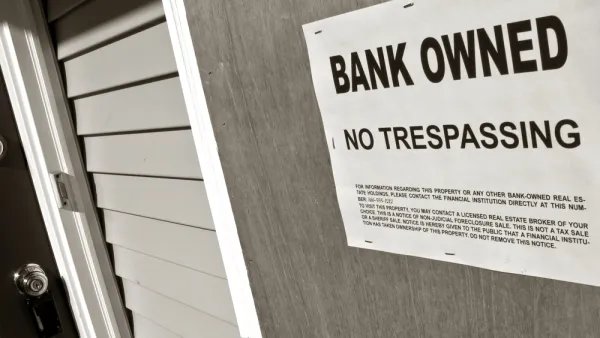The state of California is trying to prevent a repeat of one of the most significant consequences of the Great Recession: large Wall Street interests buying for-sale housing in bulk for conversion to apartments.

Oscar Perry Abello writes to summarize the shifting status of the real estate market—from private ownership by individuals to corporate ownership by Wall Street money—and to detail efforts to control the trend in California.
For a succinct description, with the key evidence, of the scope of the trend, Abello writes:
Before 2010, corporate landlords didn’t exist in the single-family market; by March of this year, Wall Street had acquired $60 billion worth of distressed or foreclosed properties across the country, representing hundreds of thousands of homes.
Most of those properties became rentals. Between 2006 and 2012, the number of owner-occupied housing units in California declined by more than 320,000, while the number of renter-occupied housing units increased by more than 720,000, according to the Public Policy Institute of California. In 2006, only 21 percent of occupied single-family houses in California were rented; by 2012, the share of houses occupied by renters had increased to 26.0 percent.
The disruption of the COVID-19 pandemic and the resulting economic downturn are expected to exacerbate the trend, according to a widely circulated article by Ryan Dezember, published by the Wall Street Journal in September. Also widely circulated: the nascent efforts by a few politicians to add regulatory controls to slow large corporate interests from buying up all the distressed properties in the market.
Enter SB 1079, a law recently adopted by the state of California, which makes it harder for big-money investors to buy foreclose properties en masse. Exactly how the law accomplishes that goal—by preventing bulk foreclosure sales and for holding lenders responsible for the upkeep of foreclosed properties—is the focus of Abello's article.
FULL STORY: California’s New Law Gives Communities a Chance to Stop the Private Equity Housing Grab

Analysis: Cybertruck Fatality Rate Far Exceeds That of Ford Pinto
The Tesla Cybertruck was recalled seven times last year.

National Parks Layoffs Will Cause Communities to Lose Billions
Thousands of essential park workers were laid off this week, just before the busy spring break season.

Retro-silient?: America’s First “Eco-burb,” The Woodlands Turns 50
A master-planned community north of Houston offers lessons on green infrastructure and resilient design, but falls short of its founder’s lofty affordability and walkability goals.

Test News Post 1
This is a summary

Analysis: Cybertruck Fatality Rate Far Exceeds That of Ford Pinto
The Tesla Cybertruck was recalled seven times last year.

Test News Headline 46
Test for the image on the front page.
Urban Design for Planners 1: Software Tools
This six-course series explores essential urban design concepts using open source software and equips planners with the tools they need to participate fully in the urban design process.
Planning for Universal Design
Learn the tools for implementing Universal Design in planning regulations.
EMC Planning Group, Inc.
Planetizen
Planetizen
Mpact (formerly Rail~Volution)
Great Falls Development Authority, Inc.
HUDs Office of Policy Development and Research
NYU Wagner Graduate School of Public Service



























